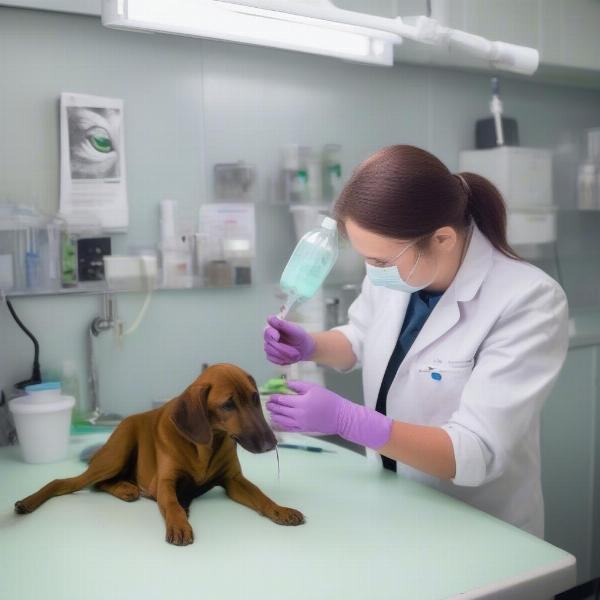Melting ulcer, also known as keratomalacia, is a serious and rapidly progressive eye condition in dogs that can lead to vision loss if not treated promptly and aggressively. This condition involves the breakdown, or “melting,” of the cornea, the clear front part of the eye. It’s a painful and debilitating condition that requires immediate veterinary attention. Understanding the causes, symptoms, and treatment options for melting ulcers is crucial for any dog owner.
What Causes a Melting Ulcer in Dogs?
Melting ulcers are typically caused by severe bacterial, fungal, or sometimes viral infections of the cornea. Certain breeds, like Boxers, Poodles, and Pekingese, are predisposed to corneal ulcers due to their prominent eyes. Trauma, dry eye, and underlying health issues can also increase the risk. In some cases, the use of certain medications, like topical steroids, can worsen existing corneal ulcers and contribute to melting.
Recognizing the Symptoms of a Melting Ulcer
It’s essential to recognize the signs of a melting ulcer early to prevent irreversible damage. These signs often include excessive tearing, squinting, redness, cloudiness of the cornea, pawing at the eye, and obvious pain. If you notice any of these symptoms, it’s crucial to take your dog to a veterinarian immediately.
How is a Melting Ulcer Diagnosed?
A veterinarian will typically diagnose a melting ulcer through a thorough eye examination. This may involve using a special dye called fluorescein, which stains damaged areas of the cornea, making the ulcer more visible.  A veterinarian uses fluorescein to examine a dog's eye. Further tests, such as cultures and cytology, might be necessary to identify the underlying cause of the infection.
A veterinarian uses fluorescein to examine a dog's eye. Further tests, such as cultures and cytology, might be necessary to identify the underlying cause of the infection.
Treatment Options for Melting Ulcer in Dogs
Treatment for melting ulcers usually involves intensive medical therapy, focusing on controlling the infection and preventing further corneal damage. This often includes frequent application of topical antibiotics, antifungals, or antivirals, as well as pain medication. In severe cases, surgery may be necessary to repair the cornea or remove infected tissue.
What are the Long-Term Implications of a Melting Ulcer?
The prognosis for dogs with melting ulcers varies depending on the severity of the condition and how quickly treatment is initiated. Early and aggressive treatment can often save the eye and preserve vision. However, in severe cases, scarring can occur, leading to partial or complete vision loss. melting corneal ulcer dog
Prevention of Melting Ulcers
While not all melting ulcers are preventable, some measures can help reduce the risk. These include:
- Regular eye exams, especially for breeds prone to eye problems.
- Prompt treatment of any eye injuries or infections.
- Avoiding the use of topical steroids in dogs with corneal ulcers.
- Managing underlying health conditions that can contribute to eye problems.
Conclusion
Melting ulcer in dogs is a serious condition that demands immediate veterinary attention. Recognizing the symptoms early and seeking prompt treatment can significantly improve the chances of a positive outcome and preserve your dog’s vision. melting ulcer in dogs Regular veterinary checkups and proactive eye care can also help reduce the risk of this debilitating condition.
FAQ
-
What are the first signs of a melting ulcer in a dog? Excessive tearing, squinting, redness, cloudiness of the cornea, pawing at the eye, and pain.
-
Is a melting ulcer painful for dogs? Yes, melting ulcers are very painful.
-
Can a melting ulcer cause blindness? If left untreated, a melting ulcer can lead to scarring and vision loss.
-
How are melting ulcers treated? Treatment involves topical medications, pain management, and sometimes surgery.
-
Can melting ulcers be prevented? While not always preventable, managing underlying conditions and prompt treatment of eye infections can help.
-
Are certain dog breeds more susceptible to melting ulcers? Brachycephalic breeds with prominent eyes are at higher risk.
-
What should I do if I suspect my dog has a melting ulcer? Take your dog to the veterinarian immediately. dog ear infection pseudomonas
Related articles:
wife taking dog knot
dog nose ointment
About ILM Dog:
ILM Dog is your trusted global resource for comprehensive dog care information. We’re dedicated to empowering dog owners worldwide with expert advice on breeds, health, training, nutrition, grooming, and more. From puppy care to senior dog support, we cover every aspect of a dog’s life. Contact us for personalized guidance to ensure your canine companion thrives. Email: [email protected], Phone: +44 20-3965-8624.